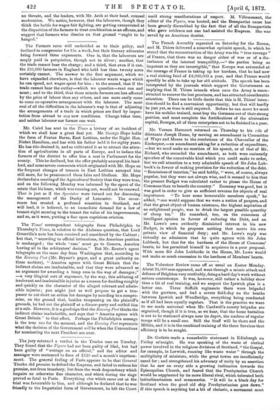Mr. Vernon Harcourt returned on Thursday to his r6le of
dilettante Joseph Hume, by moving an amendment in Committee of Ways and Means to the resolutions of the Chancellor of the Exchequer,—an amendment asking for a reduction of expenditure, —but we need make no mention of his speech, or of that of Mr. Richard, who seconded the amendment, as both were eminently speeches of the conceivable kind which you could make to order, but we call attention to a very admirable speech of Sir John Lub- bock's in favour of making provision for the reduction of the debt. "Remissions of taxation," he said boldly, "were, of course, always popular, but they were not always wise, and it seemed to him that the present Budget was calculated rather to please the House of Commons than to benefit the country." Economy was good, but it was good in order to give us sufficient revenue for objects of real importance. "To hear some honourable members speak," he added, "one would suppose that we were a nation of paupers, and that the great object of human existence, the highest aspiration of an enlightened people, was to drink the largest possible quantity of cheap tea." He remarked, too, on the consensus of intelligent opinion in favour of reducing the Debt, and on Mr. Lowe's own evidently diminished interest in his new Budget, in which he proposes nothing that meets his own private view of financial duty ; and Mr. Lowe's reply was virtually an admission that he quite agrees with Sir John Lubbock, but that for the hardness of the House of Commons' hearts, he has permitted himself to acquiesce in a poor proposal_ With more Sir John Lubbocks in the House, Mr. Lowe would not make so much concession to the hardness of Members' hearts.


































 Previous page
Previous page